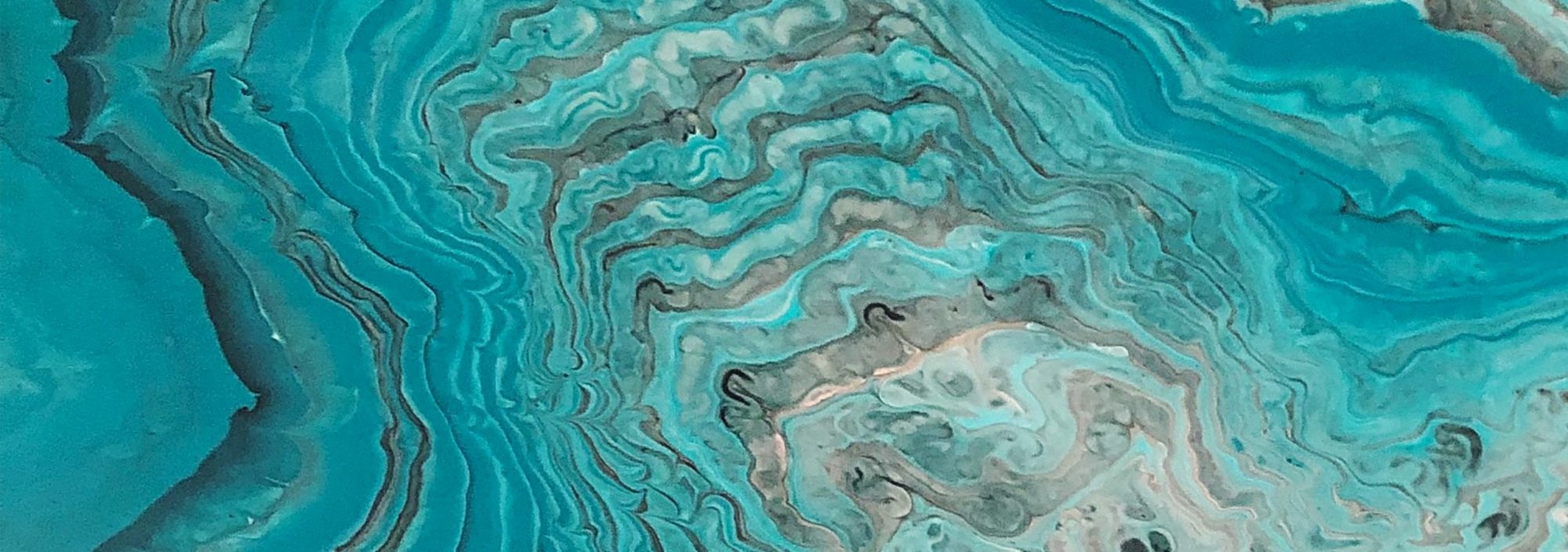

Microphyt, the microalgae expert, celebrates 15 years old : from innovative French start-up to global leader
September 20, 2022
The wonderful world of microalgae is yielding its secrets and creating opportunities for natural ingredients in the nutrition and cosmetics industries. As its competitors grapple with technological limitations, Microphyt, an innovative French marine biotechnology company, does things differently. It uses patented, controlled, environmentally friendly processes to produce microalgae on an industrial scale with the aim of extracting active natural ingredients with high added value. The innovative young firm based near Montpellier in the south of France is well on its way to global dominance. It’s a success story that we can expect to hear a lot more about.
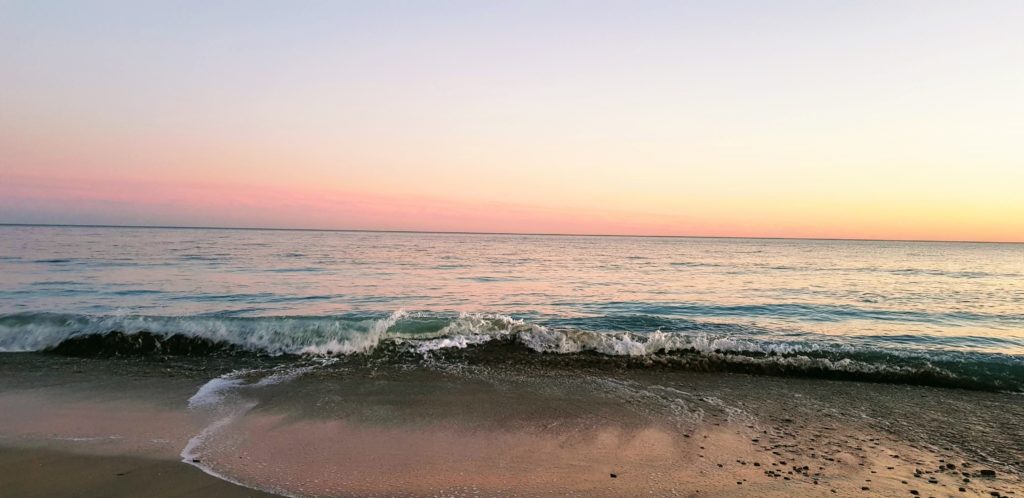
“All geography begins with the sea,” as French historian Jules Michelet liked to say.[1] And we might add that if it weren’t for the sea, life would not have emerged at all.
Microalgae are unicellular photosynthetic organisms that were instrumental in the origins of our time here on earth. Unlike macroalgae – or seaweed –, which can be found washed up on the shore, microalgae are invisible to the naked eye. They have been developing for more than 3 billion years in their natural habitats of seas, oceans, rivers and lakes. They are the main components of phytoplankton and are thought to number somewhere between 100,000 and more than a million species, only a minority of which have been identified to date.
Microalgae – vast yet underexploited potential
One of the strengths of microalgae is their ability to adapt to their environment by synthesizing metabolites, giving them transformative powers within their cells. They convert light energy and carbon dioxide from the air (CO2) into organic biomass and oxygen (O2) via photosynthesis. This alchemy generates an impressive concentration of active principles such as pigments, long-chain essential fatty acids, vitamins and amino acids.
Microalgae are the first link in the food chain and are the only living organisms capable of naturally producing polyunsaturated fatty acids (PUFAs), including docosahexaenoic acid (DHA) and eicosapentaenoic acid (EPA), which are then found in the organisms that ingest them. Another quality related to photosynthesis is the fact that microalgae produce 40% of the oxygen that we breathe, while absorbing CO2 from the air.
It is their remarkable wealth of active principles that makes them unique. The Aztecs were well aware of the potential of microalgae – they were regular consumers of spirulina, one of the most common microalgae used nowadays. But in Europe, it was not until the 1940s that scientists began to make use of their high protein content in food, especially to tackle the problems of famine. The first hatcheries for molluscs and microalgae production for aquaculture feed were built in the late 1970s in France, paving the way for future companies specializing in microalgae.
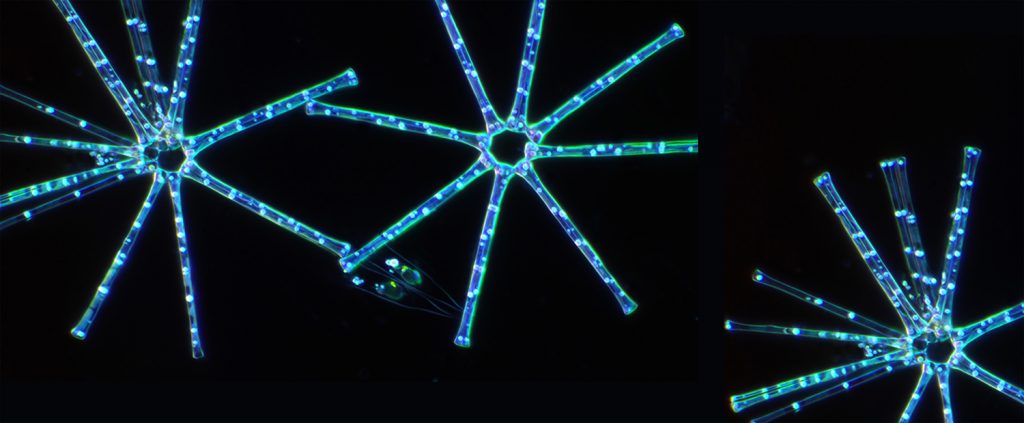
Extensive research being carried out all over the world is beginning to reveal some of the secrets of microalgae. Technological processes are being used to extract ingredients for use in nutrition and health, pharmaceuticals and cosmetics, and more broadly for green chemistry applications.
Microphyt, a pioneer with a vision
Microphyt, based in Baillargues, near Montpellier in southern France, is one of the French pioneers specializing in microalgae. Two trailblazers were behind this innovative French marine biotech established in 2007: Arnaud Muller-Feuga, a world-renowned microalgae expert and former researcher at Ifremer (France’s National Institute for Ocean Science) and the CEA (the French Alternative Energies and Atomic Energy Commission), who was joined in 2008 by Michel Lemar, a specialist in the industrialization of bioprocesses for health.
Convinced that the natural qualities of microalgae could help overcome challenges related to nutrition and well-being, they laid the scientific foundations for CAMARGUE, a technology patented in 2009 that is fundamental to Microphyt’s success. CAMARGUE reflects one of the company’s steadfast commitments: natural products must be sustainable. So Microphyt decided to handle the entire manufacturing process for its natural active ingredients derived from microalgae and to optimize each stage, satisfying the physiological needs of microalgae and adopting an environmentally responsible approach.
Microphyt’s founders have now retired but they remain closely involved in the future of the company as Scientific Consultant and Process and QHSE Consultant[2].
CAMARGUE, a technology with a difference
CAMARGUE is an exclusive, unique technology based on hydro-biomimetic principles. The aim is to reproduce the natural environment and harness the full biological potential of microalgae, while offering a high level of control. Twenty tubular 5,000-liter photobioreactors, creating a controlled loop of 2,000 meters, have been designed to culture unique microalgae strains for industrial-scale production. The flow system preserves cell integrity, optimizes gas exchange, provides agitation and creates optimal culture conditions.
The technology is used to produce large quantities of sensitive species with high added value. The production platform is linked to an integrated extraction plant, enabling Microphyt to develop and produce unique natural ingredients derived from microalgae.
The unique nature of Microphyt’s production platform is based on:
- Access to the vast diversity of microalgae, paving the way for new applications in the fields of nutrition and cosmetics,
- High active principle content thanks to optimal culture conditions,
- A high level of control, offering full traceability and the quality level demanded by target industries,
- The possibility of industrial scale-up for any microalgae species with laboratory-proven biological interest for the fields of nutrition and cosmetics,
- Modular and versatile systems, enabling simultaneous production of several species,
- Environmentally friendly production involving recycling of culture media and extraction solvents.
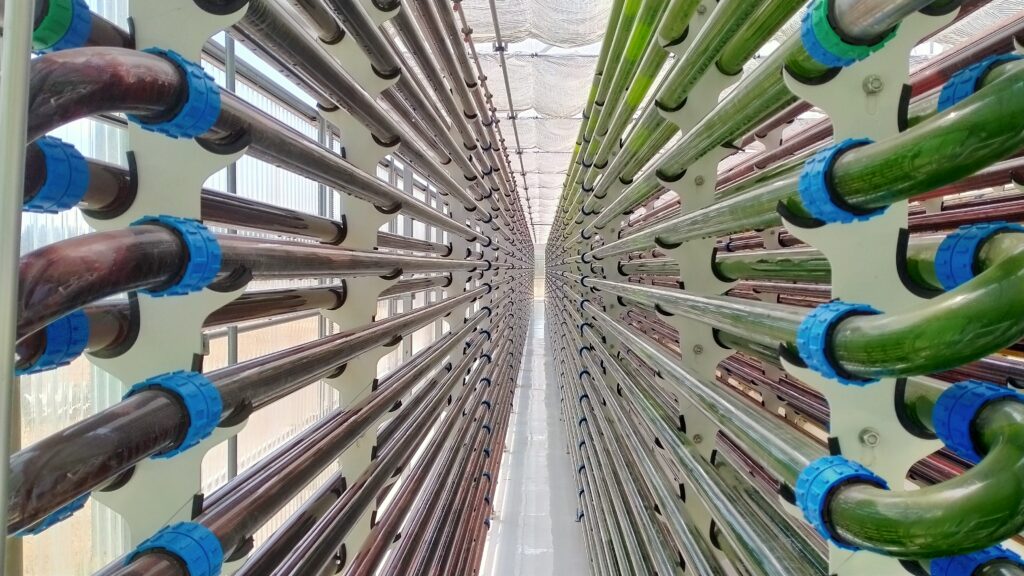
A sustainable & rational approach
Microphyt’s respect for natural ingredients and commitment to reducing its environmental impact are not empty slogans. The procedures it uses were carefully designed to be as sustainable as possible. The microalgae cultivated in CAMARGUE photobioreactors capture 4.3 times more CO2 on average than traditional systems for the same surface area. Photosynthesis is triggered by an LED lighting system powered by an entirely renewable, local energy supply. Natural solvents are used to extract the bioactive compounds and are recycled after use. The microalgae are grown using a rational, carefully devised method, with no pesticides or GMOs; they are provided with the nutrients they require in optimal quantities to meet their physiological needs. The Microphyt strain library is composed of more than 30 microalgae species and complies with operating conditions and new directives resulting from the Nagoya Protocol – Convention on Biological Diversity. In 2018, the entire company adopted a CSR strategy and received EnVol[3] certification for its action in favor of the environment.
Growth driven by a bold strategy and solid results
The company’s overriding aim is to develop, produce and propose the best natural ingredients based on microalgae. Microphyt’s continued rapid development reflects its considerable investments in innovation and the expertise of its teams. The teams are imbued with a strong R&D culture; they work in close collaboration with French and international specialists recognized for their skills and foster partnerships with scientific institutions at the forefront of biotechnology and microalgae research. Since it was established, Microphyt has explored more than 40 microalgae strains, and it is currently working on around 30 ingredients for the nutrition and cosmetics markets.
Microphyt : unique natural ingredients
Microphyt’s ambition has always remained the same: to provide natural ingredients with high added value derived from microalgae, via an integrated production process that is carefully controlled from start to finish. The qualities of these ingredients can provide specific proven benefits: maintainance of cognitive function in elderly individuals; boost of cognitive performance in a younger population; support for weight control; and skin protection, especially from the effects of aging, sun exposure and urban pollution. Each ingredient, particularly when it comes to the food supplement industry, has undergone more than a thousand analyses performed by a dozen independent, certified laboratories. All the ingredients were approved by the relevant national and European scientific authorities before being brought to market.
The laboratories and brands that incorporate these ingredients in their end products stand apart from their competitors in the nutritional supplement and cosmetics industries. Microphyt’s ingredients respond to the growing demand from consumers for natural, plant-based products that protect their health and well-being safely and effectively while responding to environmental and social challenges. By 2026, Microphyt will have added around ten new natural ingredients for nutrition and around twenty active and functional natural ingredients for cosmetics to its portfolio.
Microphyt’s two first flagship products

BRAINPHYT is a natural bioactive derived from microalgae that helps to maintain cognitive function throughout life by enhancing short-term and long-term memory, improving learning and reducing stress. Recognized by the US Food and Drug Administration (FDA) as a “new dietary ingredient” in 2019, it is marketed in the United States.

RENOUVELLANCE, derived from Porphyridium cruentum, contains a pigment rarely found on the market that offers significant benefits for skin photoaging and anti-aging in general (phycoerythrin), as well as exopolysaccharides with anti-inflammatory, anti-hyaluronidase, moisturising and antioxidant properties.
Natural ingredients, a growth market
Microphyt is targeting niche, high value-added, fast-growing markets in the sectors of nutrition (food supplements), wellness and cosmetics. The development of these sectors is being driven by an increasing demand for natural ingredients.
The global market for ingredients in the nutrition and cosmetics industries currently represents around USD 30 billion, with annual growth of 2 to 4%. The share of natural ingredients (including algae and microalgae) is seeing a strong upward trend of around 8% per year because of the consumer appeal of these products. They represent a global market of approximately USD 4 to 5 billion.
Developing the largest microalgae production platform in the world
Not a year goes by without a major event to boost Microphyt’s development. In 2021, Microphyt was selected in the “Flagship” call for proposals launched by the Bio-based Industries Joint Undertaking (BBI JU), a European initiative to promote bioindustries at global level. The aim of “Flagship” programs is to establish leading industrial sites at European level through the development of promising technologies. The SCALE program led by Microphyt is the only one of the programs selected that makes use of aquatic resources, which illustrates the unique nature of its existing production platform.
In August 2021, supported by the European Union and a consortium of 11 prestigious partners, Microphyt embarked on the extension of its SCALE production platform, based on the concept of a microalgae biorefinery. The aim is to naturally exploit all the fractions of microalgae by developing several ingredients from the same biomass yet limiting the number of co-products as much as possible. For example, biomass from Phaeodactylum tricornutum algae serves as the basis for the production of the ingredient BrainPhyt. The fractions that are not used by this ingredient are now used as an ingredient for the cosmetics industry.
With the extension of the SCALE program, a 520m3 biomass production capacity will be installed on Microphyt’s site in Baillargues, near Montpellier. Microalgal biomass will be produced via CAMARGUE tubular photobioreactors and directly extracted on site using sustainable extraction processes. This ability to develop natural ingredients derived from microalgae and produce them on a large scale will make the SCALE platform a global leader. It will be unique in terms of the range of ingredients that it is capable of generating and its reliable, industrial-scale supply capacity. These natural ingredients will replace petrochemical ingredients in cosmetics and also plant extracts produced in poorly controlled, unsustainable conditions for the nutrition industry.
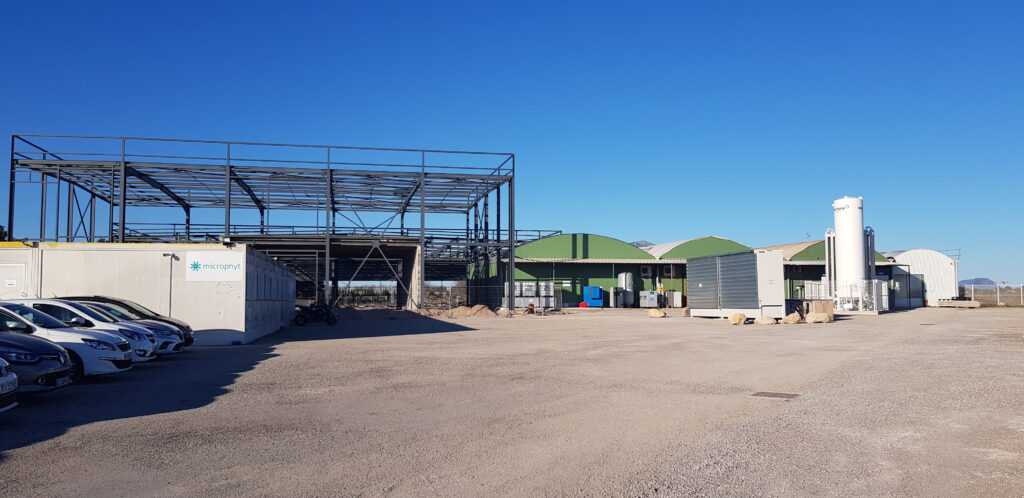
The four-year SCALE program received a grant of €15 million from BBI JU and the European Commission in 2021. The program will create nearly 60 direct jobs and 190 indirect jobs and is set to be replicated elsewhere in Europe. In line with the Microphyt roadmap, SCALE consolidates Microphyt’s three growth areas: (i) direct marketing of new natural ingredients to nutritional supplement laboratories and cosmetic brands, (ii) a large-scale production platform for the reliable, sustainable supply of ingredients, and (iii) an unparalleled capacity for innovation that lays the foundations for the development of unique ingredients for the fields of nutrition and cosmetics.
Microphyt, the leader of a new international industry
Over the coming decade, stakeholders in the nutrition and cosmetics sectors will be forced to implement new natural, sustainable solutions in response to social and global challenges. Microalgae are the perfect solution to meet these needs: they are a natural product that is produced sustainably and can be cultured in controlled conditions, and they have an incredibly diverse range of active principles. Microphyt is ideally placed at the forefront of this momentum and is committed to playing its part in the development of a global industry for natural ingredients derived from microalgae.
[1] La Mer, 1861
[2] Quality, Health, Safety and Environment
[3] EnVol, a French initiative to encourage voluntary commitment by companies to the environment. https://www.envol-entreprise.fr
Vincent USACHE Microphyt Chief Executive Officer
Julie PERSON Microphyt Project Coordinator & Communication.
Article published in La Revue Maritime no. 522 – March 2022 – Special report on Occitania – Microphyt, the microalgae expert – p.30-36
Follow us on :



